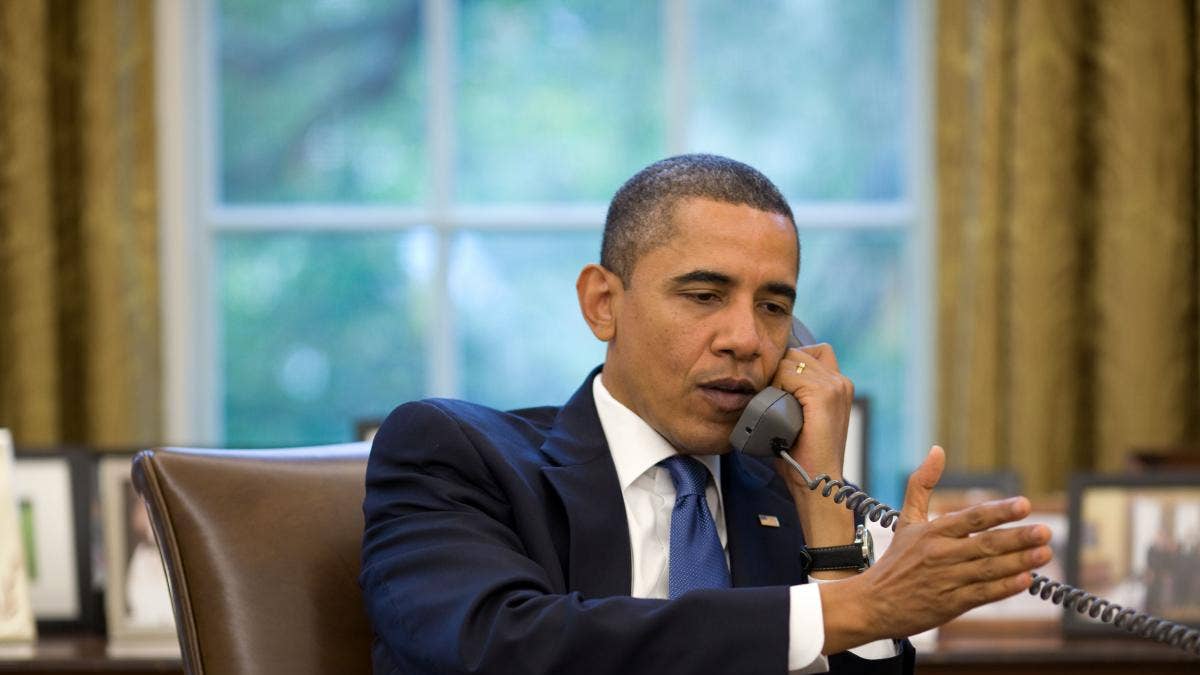
President Obama gives an interview to radio host Michael Smerconish Wednesday. (White House photo)
As post-election realism seems to be sinking in at the White House, administration officials are laying the groundwork for what they hope can be a bipartisan agenda.
However, consensus may not be easily reached when the White House and the GOP are already starting from a place of disagreement.
"[M]y expectation is that Republicans, should they win additional seats, should they be in a position to hopefully take more responsibility working with us, are gonna say to themselves that it's important for us to show some accomplishments over the next couple of years," the president told conservative radio host Michael Smerconish Wednesday. "And I think there are some areas where traditionally we've had bipartisan agreement."
Among them, the president says, is shoring up the nation's infrastructure and tackling the deficit. But the size of the nation's debt has long been one of the GOP's top Obama policy targets.
House Republican Leader John Boehner says that fueling the nearly 1.3 trillion dollar deficit are the very programs Mr. Obama instituted in his first two years.
"Over the past 20 months, Americans have watched as the governing party in Washington has pursued an agenda more focused on growing the size of government than addressing their priorities," the Ohio congressman said earlier this month.
In recent weeks, tucked into talk of political fortitude, both Mr. Obama and his aides have said the issue is one in which they can work with Republicans. However, the president has suggested taking a lighter approach to cutting federal programs.
"[W]hat people are absolutely right about is that we've got to make sure that moving forward, we're doing so in a responsible way. And the best way for us to do it is to do it with a scalpel, not a machete," the president said in the radio interview.
Also on the post-election agenda for the Obama White House is a residual promise to the party faithful to repeal the military's "don't ask, don't tell' policy banning openly gay service members in the military.
Efforts to change the law legislatively already failed under a Democratic majority and reviving the issue under a GOP-heavy congress will stir up old controversies. The Defense Department is still reviewing the policy and the White House promises one way or another, the policy will change.
Finally, who can forget the president's overhaul of health care? Republicans are still promising to repeal the plan, even as implementation continues nationwide. In fact, it's in their platform.
"Together, we can make good on 'A Pledge to America.' We can repeal ‘ObamaCare' and start over, focused squarely on lowering the cost of health care and protecting American jobs," says Boehner.
Senior Obama advisor David Axelrod admits the makeup of the Congress will determine the course of the legislative agenda, but he says he hopes the dialogue will be decidedly non-political.
"I think it's very clear that we have an election next week in which whatever the ultimate outcome is, there will be more parity between the parties here in Washington," Axelrod said in an online chat, hosted by the White House Tuesday.
He continued, "I'm hoping that will imbue folks on the other side with a greater sense of responsibility and an interest in cooperating. And they will meet with a-- they will meet with a welcoming hand from us."
In the Smerconish interview, Obama added, "[T]here is no doubt that voters across the board, I think, want to see Washington work. They don't want games, they don't want posturing...They want us to focus on them, on jobs, on the economy, on keeping small businesses open."
Finding common ground with the GOP on the jobs front is surely in the president's interest. After all, 2012 is right around the corner.




